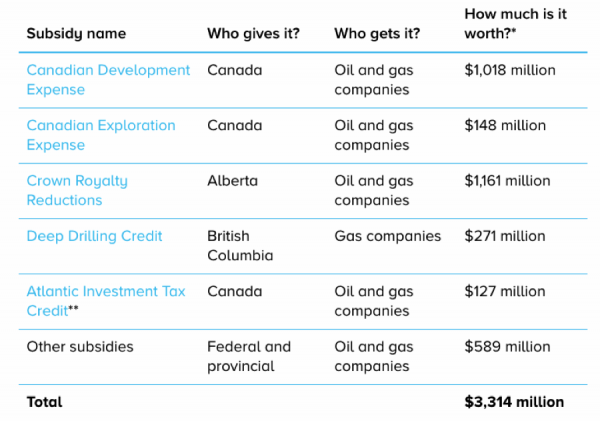Lanlin Bu and Michael Bloomfield
with research and writing assistance from Adrian Southin
Corporate social responsibility (CSR) runs the gamut from self-aggrandizement to crisis management to with the occasional act of generosity. Society deserves better! Tax payers invest heavily in business, providing research and development grants, tax breaks, transportation facilities and many other subsidies including cleaning up the environmental messes too often left behind. According to a 2014 Fraser Institute report, over a period of nearly 30 years, federal, provincial and local authorities spent nearly $684-billion on business subsidies. The fossil-fuel industry alone receives over $3.3 billion (CAD) annually (See Chart 1 below) 1.
Chart1: Major Subsidies to Fossil Fuel Industry in Canada (2013-2015, average)

(From http://www.iisd.org/faq/ffs/canada/ )
Simply put, business owes society a fair return on its investment. More than that, companies gain and retain social license through product safety, compliance with legal standards, honest reporting, “truth in advertising”, protection of the environment and public health, as well as fair treatment of employees, customers and local communities. Volkswagen, a company that once topped the Dow Jones Sustainability Index, plummeted after the shocking emission scandal of 2015 2. A long and tough road to recovery will cost VW billions.
So what’s a better way forward? First, let’s restore balance, recognizing business is part of society not its master. Business needs to work more collaboratively with civil society to advance the social development, human rights and environmental stewardship. Furthermore, it’s in business’ best interest because responsible companies get rewarded. Studies show that healthy, happy employees are more productive and absenteeism decreases.3 Customer loyalty tilts toward companies they trust and respect, those who demonstrate high social and environmental performance. In addition, business does best in well-educated, prosperous and healthy societies. Moreover, if the advocates for a global economy are to be believed the movement should be about creating more opportunities in disadvantaged places not exploiting lower standards for worker health and safety, accountability and environmental protection.
CSR is much more than just marketing tool or stay-out-of-jail card. For companies to truly be responsible, they need to commit throughout their operations. Take Loblaws as an example. It’s great they have programs such as the President’s Choice Children Charity. Yet, through the Joe Fresh brand, Loblaws was one of the companies involved in the 2013 Rana Plaza sweatshop collapse in Bangladesh that killed over 1100 people.4 Justice still has not come to the victims. Similar examples include Streit Group’s sales of armoured vehicles to South Sudan 5 and Saudi Arabia, Tahoe Resources and Goldcorp’s mistreatment of local residents in Guatemala, and Canada’s tobacco and toxic waste shipped to Asia. This kind of behaviour overseas is damaging Canada’s reputation and relationships. No wonder Canada is increasingly seen as just another country willing to compromise public health, human rights and the environment to increase profit. Why do we allow these companies to hide behind lax local regulations to justify their actions while representing Canada abroad?
Sadly it’s not just overseas where Canadian companies are failing to meet public expectations. The Mount Polley BC tailing ponds breach by Imperial Metals, CN Rail’s denial of any responsibility in the Lac-Mégantic disaster and the Canadian clients of KMPG involved in an offshore tax scheme on the Isle of Man 6, each demonstrating how business puts profit over its legal and moral responsibilities, even here in Canada. Don’t we Canadians deserve better?
It’s time to a shift CSR away from brand promotion and crisis management.Transformational CSR must become corporate culture, practiced up and down the chain of command. Corporations must work in good faith with all stakeholders, including civil society to achieve economic development without harming the environment and public health.
The voluntary approach relies too much on the goodwill of individuals rather than a committed corporate culture. Furthermore, voluntary efforts do not provide a level playing field for business, favouring the laggards over the leaders who already are investing in positive action on conservation, climate, human rights, worker health and safety and so on.
Therefore Harmony Foundation proposes that senior levels of Canadian government work with business and civil society to develop and implement a protocol that guarantees the same standards of human rights, health and safety, and environmental protection, whether operating in Canada or aboard. Not only it is the right thing to do, but also this is our best chance to improve Canada’s reputation and long-term opportunities internationally. That would truly be the Canadian advantage! In fact, that’s the clearest path to prosperity with integrity.
Please see our paper “CSR: Society’s Return on Investment“ for more on this topic. The paper lays out in more detail the elements of the protocol which was first presented in Canadian Mining Operations Around the World: Respecting People and the Environment (2013)
- http://www.iisd.org/faq/ffs/canada/[↩]
- https://www.theguardian.com/sustainable-business/2015/dec/30/vw-exxon-lobbying-brazil-mining-tragedy-toshiba-corporate-scandals-greenwashing-climate-change[↩]
- http://www2.warwick.ac.uk/newsandevents/pressreleases/new_study_shows/[↩]
- http://www.cbc.ca/news/world/bangladesh-garment-workers-lives-still-at-risk-the-fifth-estate-finds-1.1959518[↩]
- http://www.theglobeandmail.com/news/world/canadian-company-sold-armoured-vehicles-to-south-sudan-report/article31191713/[↩]
- http://www.cbc.ca/news/business/canada-revenue-kpmg-secret-amnesty-1.3479594[↩]

